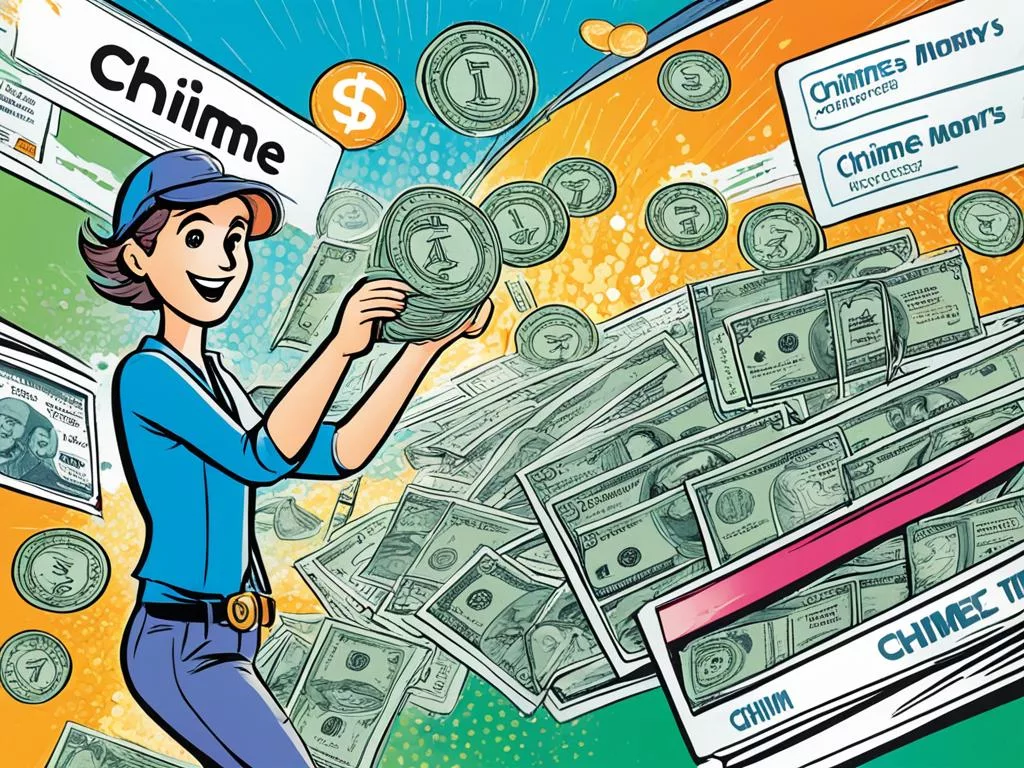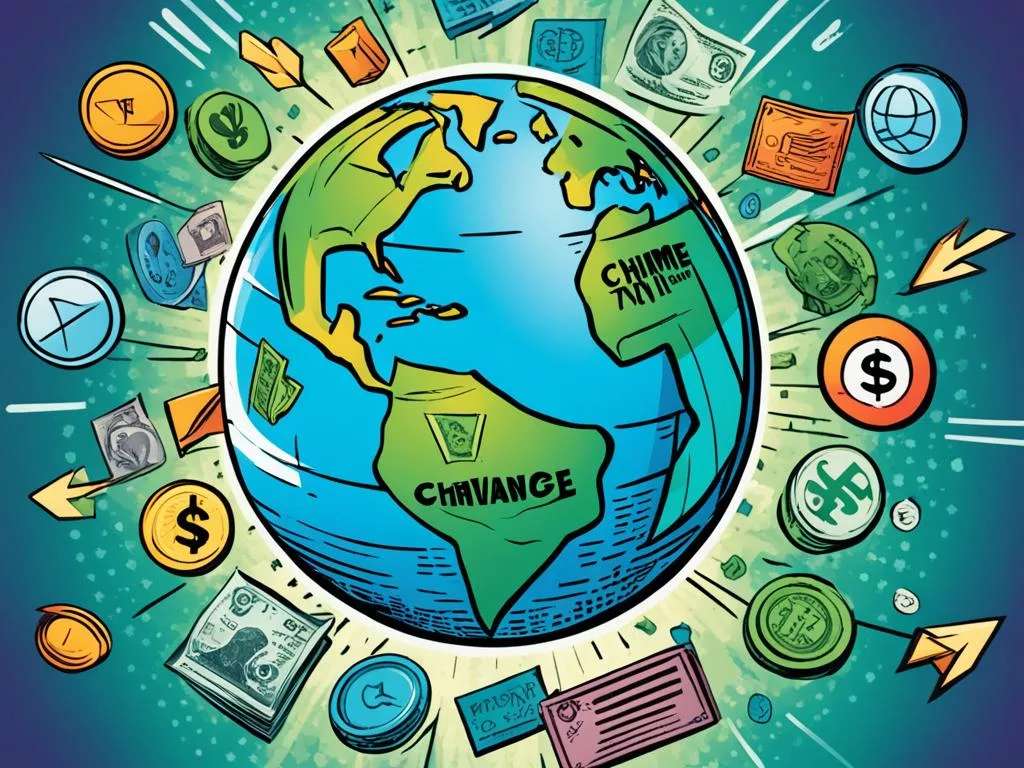Did you know lots of money goes abroad from Americans every year1? Chime, an app that changes how personal finances are handled, helps with this. It lets users send money internationally through Wise. This service is known for clear fees and using real exchange rates. Though Chime doesn’t do international wires itself, this feature is quite helpful.
Chime has improved how we send money to other countries. By teaming up with Wise, users can easily do cross-border payments1. Chime was once called out by CFPB for claims about fast transfers they couldn’t always deliver1. Still, its card lets people shop internationally without extra fees. This is a win against cards from Chase and Citi, which often charge 3% more2.
It’s key to know about international dealings with fintech apps. Chime shines with its checking account and debit card. They save customers from high foreign transaction fees2. As we deal with global finances, Chime’s services are very useful for saving money and hassle.
Understanding Chime’s Position in International Money Transfers
Chime’s approach to global payments involves teamwork with outside money transfer services. Due to limits on Chime’s own system, they rely on others for international transactions. Despite a high rating for its mobile app, Chime users need to use other providers for worldwide payments.

Many Americans send money to family abroad, creating a big need for easy international transfers. Chime steps in not by sending money itself, but by recommending trusted partners. However, Chime had to deal with a penalty and refunds for claims of “instant” transfers that were not met.
To improve transparency, Chime might gain by adopting a new CFPB rule for nonbanks to publicly share their service terms. This way, Chime encourages its users to speak up to the CFPB if they’re unhappy, putting customer service first.
In a world where actions against remittance services shape choices, Chime’s partnerships provide access to higher transfer limits and lower fees. By guiding users to other services, Chime smartly works within its own limits to help customers with their international money needs.
- Third-party partnerships augment Chime’s service capabilities.
- Refunds and penalties underscore the importance of accurate marketing information1.
- Customer advocacy is bolstered by avenues to submit service complaints to the CFPB1.
Looking at Chime’s business strategy, it’s clear they focus on making things easier for users. By working with partners, they stay relevant in the remittance market without handling transfers themselves. Their method shows a deep understanding of what consumers want and the strength of working together in finance.
The Basics of Chime’s International Transfer Capabilities
Understanding Chime’s features for managing money across borders is crucial. Even though Chime doesn’t offer direct Chime international wire transfer, you can still send money abroad with Chime through partnerships with other services. Here’s how easy it is to start making international payments using Chime.
A deep dive into 182 financial institutions looked at 65 unique characteristics. This resulted in over 11,830 data points3. Our findings show Chime makes global money transactions simpler. It gets rid of big fees usually found with these types of services.

A special feature is the 2.00% Annual Percentage Yield with Chime® Savings Account3. With Chime®, you can get your paycheck up to two days early. Plus, there’s a $0 monthly fee34. You also get up to fee-free overdrafts of $2004. This is great for when you need a bit of financial room to breathe.
The Chime app is a big part of Chime’s system. It’s available for both Android and iOS3. The app helps you manage your money for overseas transfers. Chime gives you access to over 60,000 ATMs in the U.S. You can also make cash deposits at more than 85,000 places. This makes getting to your cash easy.3
Chime makes it easier by not doing hard credit checks for a Chime Visa Debit Card. You also don’t need to keep a minimum balance to start a Savings Account3. Below is a table that shows how Chime can help with international money matters:
| Feature | Description | Benefit |
|---|---|---|
| Automated Savings Tools | Round Ups and Save When I Get Paid | Makes saving money easy with everyday transactions |
| Fee-free Overdraft | Up to $200 protection | Gives extra help for surprise bills4 |
| ATM Network | 60,000+ fee-free ATMs | Gives easy cash access all over the U.S.3 |
| Deposit Partners | Over 85,000 cash deposit locations | Makes it simple to add cash to your account3 |
| Secured Credit Card | Chime Credit Builder Visa Credit Card | Helps improve your credit score by reporting to major bureaus3 |
In conclusion, Chime might not do direct wires abroad, but it’s great for using third-party services. Chime’s appeal comes from zero hidden fees, a big ATM network, and the benefit of a strong savings account APY. It’s a useful tool for your money, both here and abroad45.
Step-by-Step Guide to Using Wise for Transfers via Chime
Sending money abroad is now easier with Chime and Wise. First, verify your Wise account. This makes sure your transactions are secure6. You’ll need to sign up with Wise and follow their steps for verification. This keeps everything safe and follows rules7.

Once your Wise account is ready, you can send money internationally. Pick how much to send and in what currency. Use Chime to make the payment and move your money to Wise’s network7. Chime is great for this since it’s not limited by savings account rules6.
Next, fill in the receiver’s information correctly. Funds usually arrive in 2-3 business days with Wise. This speed is thanks to Wise’s wide banking network7. Yet, transfers might get declined sometimes due to bank checks or fraud prevention7.
Big transfers or high-traffic times may be checked more closely. This keeps your money safe from fraud. Wise works with banks globally to keep costs low and your money secure7.
Using a credit card for transfers can be pricey because of extra fees8. Chime is cheaper for funding transfers, avoiding high costs and APRs. It’s effective for direct USD transfers8.
This guide shows how Chime and Wise make sending money easy and cheap. You avoid the high costs of traditional bank transfers67.
Pros and Cons: A Balanced Review of Chime for Foreign Exchange and Transferring Money Internationally
Understanding Chime advantages and Chime disadvantages is key when looking at Chime foreign transactions and international payment options. Chime teams up with third-party providers like Wise to offer a new way to transfer money internationally. This means instant transfers and clear info on fees and exchange rates. But, Chime doesn’t directly manage international payments. This might be a downside for people who want all services in one place.
- Third-party providers recommended by Chime often provide low-cost solutions for international money transfers.
- Users have the ability to shop for services offering the best exchange rates and lowest fees.
- Transfers can be funded easily through a Chime bank account or Chime card.
- The process still lacks the convenience of direct international payments through Chime.
The new FedNow Service launched in July 20239 is changing the game in instant payments. It took $545 million9 to set up, and around 9,000 banks and credit unions are joining9. Instant payments will become more common. It’s interesting to think about how Chime will fit into this future.
Old ways of transferring money are becoming outdated. For example, wire transfers are quick but can cost you $20 to $75 or more10. ACH transfers have lower limits than wire transfers do10. In this sense, Chime’s recommendation of cheaper third-party services can save consumers money.
When it comes to currency conversion, some platforms offer better rates than others. Revolut, for instance, gives you better deals like turning $10 into 9.21 euros, more than Visa’s 9.15 euros before fees11. Choosing the right service for international payments, along with Chime, can be really cost-effective, especially for those traveling often.

In summary, Chime is a modern tool for handling your money without foreign transaction fees. Yet, its indirect way of dealing with international payments might not suit everyone. The evolving financial world, with services like FedNow and multicurrency accounts, suggests staying informed is vital for making the best international transaction decisions.
Comparing Chime to Traditional Banks for Global Money Transfers
I’m looking at how Chime and banks handle global money transfers. I focus on their services and fees. Banks usually charge for sending and getting money from other countries. Chime works with third-party services to make international transfers easier12.
Chime doesn’t charge monthly fees. This makes it easier for people like me to use third-party services for international wires12. The third parties set their fees and exchange rates. This can lead to lower costs compared to some banks.
Chime also doesn’t add extra fees for using their card abroad. But, there’s a $2.5 fee for using ATMs not in their network when you’re outside the US12. It’s important to look at these fees closely if you send money abroad often.
Chime offers features like no-fee overdraft and an easy-to-get credit card12. These benefits appeal to people like me who prefer modern financial tools over traditional banks.
Though Chime mainly works in the US, it partners with services like Revolut. Revolut helps send money to over 200 countries and even has accounts for teens.
In conclusion, Chime’s choice to partner with third-party wire services puts it ahead. These deals offer better fees for global transfers. As someone interested in finance, I find comparing Chime to banks very helpful.
Navigating Exchange Rates with Chime
When talking about spending money internationally, the Chime exchange rate often comes up. Using my Chime card abroad, my purchases are automatically converted at the card network’s exchange rate. This skips the Chime foreign transaction fee13. Exchange rates change daily, so it’s important to know how this affects spending. For example, in January, Revolut users got €9.21 for $10, but Visa gave only €9.1511.
Chime’s lack of foreign transaction fees puts it ahead, especially against typical credit cards. Those cards charge about 3% for each foreign transaction13. This difference means real savings, as other options might add up costs from issuer and network fees to the same 3%13. For anyone traveling often or shopping from international websites, Chime’s policy is a big plus in managing money.
typically beat those you’d get with cash, especially in tourist spots and airports11. This changes the way I handle money when I’m abroad. Getting a Chime account, known for not charging foreign transaction fees, fits well with my financial strategies in today’s world.
Using a Chime card for spending overseas avoids extra costs, like foreign transaction fees mentioned by the Chase Freedom Unlimited® card13. This makes buying things from other countries more affordable.
Choosing a card without foreign transaction fees matters a lot to me as an international traveler. Chime stands out by not charging the usual 1% to 3% fees that others do on foreign purchases13.
In summary, my experience shows that Chime offers a cost-effective and open way to spend money overseas. Comparing Chime’s exchange rates to others shows it helps reach my financial goals. It offers a simpler, savings-filled route in the often complicated world of foreign currency.
Security Measures and Consumer Protection in Chime’s Transfer Services
Researching digital banking has shown me how important security is. This is especially true for financial transfers. Consumers trust Chime secure transfers a lot. That’s why it matters that Chime had to give back nearly $1.5 million to its users. This move helped grow trust in Chime’s promise to keep users safe1. When it comes to sending money around the world, always go with licensed providers. Chime’s parent company, WorldRemit, made close to $400 million in 2021. This shows they’re doing well financially, which is good for security1.
The Consumer Financial Protection Bureau (CFPB) shared a report that got me thinking. It’s key to look into claims that Chime’s ads promised instant transfers with Sendwave. If that’s not true, it could mislead people1. We should be careful in choosing a transfer service. Investigations found that Chime sometimes struggled to fix mistakes in their transfers1.
We must check if a service is open about when money can be sent and the exact exchange rates1. As Americans send lots of money to Africa and Asia, they need to know their money is safe with Chime card safety. The CFPB has acted against some money transfer services. This shows why it’s crucial to pick a safe way to send money1.
Chime’s move to refund some fees to users sending money to Nigeria shows they really care about their customers. This strengthens trust in Chime card safety1.
Here’s a table that explains key actions by Chime and how they help protect customers:
| Action by Chime | Impact on Consumer Protection |
|---|---|
| Refunds to Affected Consumers | $1.5 Million in refunded fees ensuring transparency and trust1 |
| CFPB Penalty Payment | Contribution of $1.5 Million to victims relief fund, reflecting responsibility1 |
| Auditing Transfer Error Policies | Strengthening internal procedures to prevent future errors1 |
| Accurate Disclosure of Fund Availability Dates | Enhanced clarity for consumers anticipating funds1 |
| Proper Exchange Rate Representation | Guaranteeing the precise value of funds sent abroad1 |
As a consumer, knowing all about financial transactions is essential, especially for international transfers. Chime’s efforts to make its users feel secure are impressive. They want to ensure their cardholders are protected. This approach to creating a trustworthy and clear financial environment matches what I look for in reliable financial services.
Maximizing Benefits with Chime’s International Money Transfer Features
I enjoy using Chime for its smart banking options. When sending money abroad, choosing the right third-party service is key. This ensures you benefit from Chime’s features, like no ATM fees nationwide. There’s a top money transfer service that works well with Chime. It makes sending money to other countries easy and might even let you avoid overdraft fees if you’re eligible3.
Chime is great because it gives you 2.00% APY on saving accounts. This helps me save more money for sending abroad3. The Chime app also keeps me in the loop with daily balance and transaction updates. This is very important for managing international payments3.
Using Chime effectively for worldwide transfers means working with the best third-party providers. Chime offers perks like access to over 60,000 fee-free ATMs. It also has features that help save money, like Round Ups. This makes Chime excellent for both local deposits and international money transfers3.
Source Links
- https://www.consumerfinance.gov/about-us/newsroom/cfpb-takes-action-against-operator-of-sendwave-app-for-illegally-cheating-people-on-international-money-transfers/
- https://time.com/personal-finance/article/foreign-transaction-fees/
- https://www.forbes.com/advisor/banking/chime-review/
- https://wise.com/us/blog/chime-reviews
- https://www.marketwatch.com/guides/banking/chime-review/
- https://www.sofi.com/learn/content/how-to-transfer-money-from-one-bank-to-another/
- https://www.bogleheads.org/forum/viewtopic.php?t=429105
- https://www.discover.com/credit-cards/card-smarts/wire-transfer/
- https://www.federalreserve.gov/paymentsystems/fednow_faq.htm
- https://www.experian.com/blogs/ask-experian/what-is-the-difference-between-ach-and-wire-transfer/
- https://www.nytimes.com/2023/02/09/travel/multicurrency-accounts-exchanging-money.html
- https://www.nj.com/personal-finance/article/chime-vs-revolut
- https://www.bankrate.com/finance/credit-cards/a-guide-to-foreign-transaction-fees/

